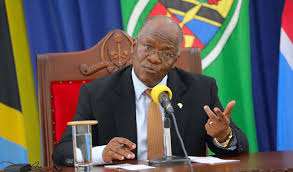AUTHORITIES in Tanzania have launched an unprecedented crackdown against opposition leaders, journalists and members of the civil society just four months before the East African country is scheduled to hold presidential and parliamentary elections.
Although President John Magufuli has pledged to conduct free and fair elections and he denies that his government is cracking down on dissent, analysts take his pledge as a mere lipservice because the increasingly anti-democracy actions of his administration speak louder than his words.
With him having formally launched his re-election bid for the upcoming October poll, there is a growing concern both at home and abroad that the events currently unfolding in Magufuli’s Tanzania bear all the hallmarks of an authoritarian regime.
A brief chronology of major incidents reported across the country in the past three weeks sheds some light:
June 9, 2020
In the capital, Dodoma, the leader of the main opposition party (Chadema), Freeman Mbowe, was assaulted at night by a group of unidentified thugs who broke one of his legs, leaving him in crutches. Police and the ruling party cadres used the event to ridicule Mbowe and to spread some negative propaganda against him.
June 23, 2020
Police raided an internal meeting of another opposition party (ACT-Wazalendo) and arrested the party leader, Zitto Kabwe, a key political figure, along with seven other members of his party. They were held in police custody for more than 30 hours before being released without charge.
June 23, 2020
The government revoked the licence of a privately-owned newspaper, Tanzania Daima, so far the only remaining daily paper publishing critical news against the government. The Magufuli regime continues to silence critical media before the October 2020 general election. After MwanaHALISI and Mawio newspapers, which were silenced over the past two years, Tanzania Daima becomes the newest casualty of independent newspapers permanently shut down by the Magufuli administration.
June 24, 2020
Police in the commercial capital Dar es Salaam stopped an internal meeting of civil society campaigners organised by the Tanzania Human Rights Defenders Coalition (THRDC), saying they were not satisfied with the theme of the meeting. Then the government threatened to deregister THRDC on the grounds that it did not comply with its registration mandate.
Since June 2016, Magufuli placed a blanket ban on political activities and rallies until the October 2020 elections. But while opposition leaders have been repeatedly arrested and harassed by the police for conducting political activities, ruling party (CCM) leaders and members have been allowed to freely conduct their political activities.
‘So beautiful, yet so troubled’
Over the past five decades, Tanzania has been seen as a relatively peaceful country in the Great Lakes region and has largely avoided any major political violence since returning to multiparty politics in the 1990s.
But analysts warn that Tanzania’s fragile peace could be at risk if the government continues to intensify its crackdown on dissent.
“Tanzania is so beautiful yet so troubled. People deserve democracy, not crackdowns,” Mark Green, the immediate former Administrator of the US aid agency (USAID) and a one-time US ambassador to Tanzania said on Twitter on June 26.
Ambassador Green was reacting to a statement from the US Senate Foreign Relations Committee issued after the arrest of Kabwe and his supporters.
The Senate committee said Kabwe’s arrest mirrored “a deeply disturbing trend of opposition party leaders and journalists in Tanzania being arrested on contrived charges leading up to October elections.”
Amnesty International said in a statement on June 24 that the ongoing crackdown was consistent with the constant harassment and intimidation that opposition leaders have been subjected to by the authorities in the recent past.
“These arrests (of opposition figures) are a calculated move to harass and intimidate the opposition and critics ahead of the elections, to restrict their human rights and limit their campaigning,” Seif Magango, Amnesty International’s Deputy Director for East Africa, the Horn and the Great Lakes, said in a statement.
Undoing democracy
The rights group the Committee to Protect Journalists (CPJ) urged the government on June 26 to immediately restore Tanzania Daima’s license and allow all newspapers to publish freely.
The newspaper was banned after reporting a story quoting a Tanzanian Lutheran Church bishop, Benson Bagonza, on the need for for a peaceful protest on July 7 this year to push for the establishment of an independent electoral body before the polls.
Tanzania Daima was previously banned for 90 days in 2017 on allegations of publishing false information, according to CPJ.
The ownership of the newspaper is linked to the family of the official leader of the opposition, Mbowe, whose other businesses have also been raided, seized, and shut down by authorities in the past two years.
“Tanzania’s government has used flimsy pretexts to repeatedly crackdown on journalists for simply doing their jobs. From this pattern the only obvious intent is to smother critics and independent voices,” said CPJ’s sub-Saharan Africa representative, Muthoki Mumo.
On several occasions, Western embassies in Tanzania have raised concern about the shrinking space for democracy, human rights and freedoms in the country.
On June 24, the US Embassy in Dar es Salaam issued a statement warning against a “disconcerting pattern of intimidation toward opposition members, civil society and media outlets.”
In all aspects, Magufuli looks set to borrow a leaf from Rwanda’s Paul Kagame regarding strategies to frustrate and silence the opposition, critics and media.
Above all, in the prevailing COVID-19 situation, it is likely that Tanzania will hold the October elections without international observers. But, with or without the observers, the world is obviously watching.










